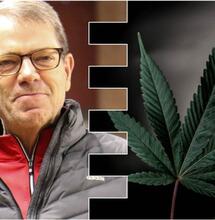Hemp Uprising

The recent legalization of hemp cultivation in Kentucky presents a legal quagmire, as the DEA maintains jurisdiction
The recent legalization of hemp cultivation in Kentucky presents a legal quagmire, as the DEA maintains jurisdiction
| Hemp harvesting (WikiMedia Commons: Lossenelin) |
Cultivation of industrial hemp plants in Kentucky was passed via Senate Bill 50, back in April of 2013. Unfortunately, this presents a complicated win for farmers, who now must circumvent federal restrictions to actually grow the crop. Their only hope is for hemp farming to be pinned to the latest farm bill by the Senate Agricultural Committee, which decides America's food and farming policies and is re-evaluated every five years.
Hemp and Cannabis activists in the United States have long lamented the nation's ban on industrial hemp farming. Considering the size of the American population, the amount of arable farm land and the struggling farmers themselves, it makes no sense that we must source our hemp products – or raw materials, in the case of American hemp product manufacturers – from Canada and other foreign countries. Importation strips potential profits from cash-strapped American farmers, and the carbon footprint of purchasing such items from abroad offsets much of the benefit of buying natural products in the first place.
The worst, and most pressing issue is that production of industrial hemp – the non-psychoactive Cannabis plants used to make more than 30,000 products – still falls under the jurisdiction of the Drug Enforcement Agency (DEA), rather than the Food and Drug Administration (FDA) or agricultural regulation groups. This is nonsensical, as by definition, industrial hemp plants contain less than 0.3 percent THC and are therefore incapable of imparting any drug effect. In addition, hemp plants contain higher amounts of other cannabinoids such as cannabinol or CBN, which counteract the effects of THC and can give the user a pounding headache.
Two things must occur before hemp cultivation can be restored across the United States. Firstly, the relevant agricultural departments should be allowed full jurisdiction over hemp licenses. Secondly, hemp should be removed from the Schedule I list of substances, where it is senselessly classified as a 'drug' posing great potential danger to society, with no known medical benefit or value, along with drugs such as heroin. Rescheduling would also remove hemp plants from the jurisdiction of the DEA.
Some cities and towns across America have approached legalizing hemp cultivation by creating a state-level licensing system, although any attempts to gain DEA exemption certificates have failed thus far. Washington, Oregon, Colorado, North Dakota, Montana, West Virginia, Maine and Vermont currently enjoy local laws allowing hemp farming, but a state-wide effort has, for now, only been successfully undertaken in Kentucky.
One misleading argument against hemp cultivation is that farmers would use their crops to disguise illicit plantations of Cannabis. This is improbable, as smoke-able pot planted next to hemp would cross-pollinate, thereby rendering the smoke-able weed nearly useless, as well as altering the genetics of the approved hemp crop. Whereas we only smoke the dried flowers from female Cannabis plants, industrial hemp farmers do not cultivate by gender, hence the potential for cross-pollination. In addition, hemp fields are easily distinguishable from weed, as weed is usually planted one-per-meter or less outdoors, while hemp field density is typically hundreds of plants-per-meter.
Many media outlets report about hemp in an inaccurate fashion, with the accepted definition of the plant being the 'roots, stems and leaves of pot plants.' Others attempt to elaborate, claiming that hemp plants are simply male Cannabis, while the females are smoked. The truth is that hemp and smoke-able pot plants are simply different varieties, and never cultivated next to each other – or in fact, in any sort of proximity – to each other.
These misguided arguments had dissuaded some Kentucky legislators and law enforcement from supporting the bill to legalize hemp production, despite the vast benefits available to future hemp farmers. Kentucky's agricultural sector would profit mightily from industrial hemp cultivation, which the opposition can no longer ignore. Governor Steve Beshear (D) represented one of the final hurdles to be surmounted by the pending legislation, which passed without his support through both the House and Senate after brusque opposition and drawn-out deliberations.
Beshear has acknowledged the increased revenue that Kentucky farmers would collect if allowed to grow hemp, while simultaneously expressing concern about criminals using the industrial crop as cover for illicit pot grows. He explained to the Lexington Herald-Leader, “At the same time, we have a tremendous drug problem in Kentucky, and I want to make sure that we don't do anything that will increase that drug problem. I still share the same concerns our law enforcement officers have about the impact hemp cultivation may have on our drug eradication efforts.”
The idea that hemp cultivation will, in any way, affect the legal or illegal drug trade is a non-issue. Hemp plants, as mentioned above, are simply contain 0.3% THC or less; any plants above that amount would not be licensed for growth by Kentucky farmers.
Tens of thousands of hemp plants offer different strengths and weaknesses; that is, the varieties of hemp plants grown for eventual production of hemp seed oil products would likely be different than the strains used to make paints, varnishes and lacquers. Likewise, large-scale textile manufacturers interested in keeping their raw material production in-house would perhaps need to grow different varieties of hemp than paper mills or their suppliers. Hemp hurds or shives – the woody core of hemp plants, high in cellulose – are typically used in the production of building materials, biofuels or paper, while the long, outer fibers are usually used for making textiles, ropes or cordage. Excess plant parts can be recycled into mulch or donated to community projects.
The most essential benefits of legalized hemp cultivation will be seen in the environment; these may take longer to show themselves, but will ultimately benefit our society in the most positive and long-lasting manner. Planting hemp prevents erosion and mudslides in flood-prone areas (e.g., along riverbanks); hemp crops anchor the soil to the ground in dust bowl areas. The plant itself is hardy and pest-resistant, making it easy to grow and requiring few, if any, pesticides. Hemp plants have even been known to resist hurricanes and forest fires, making it the perfect crop – and subsequent building material – for areas such as 'hurricane alley', and for use as a sort of firewall.
If industrial hemp is to be successfully legalized across the United States, intense lobbying needs to be done in order to keep the crop a mainstream, non-partisan issue.



